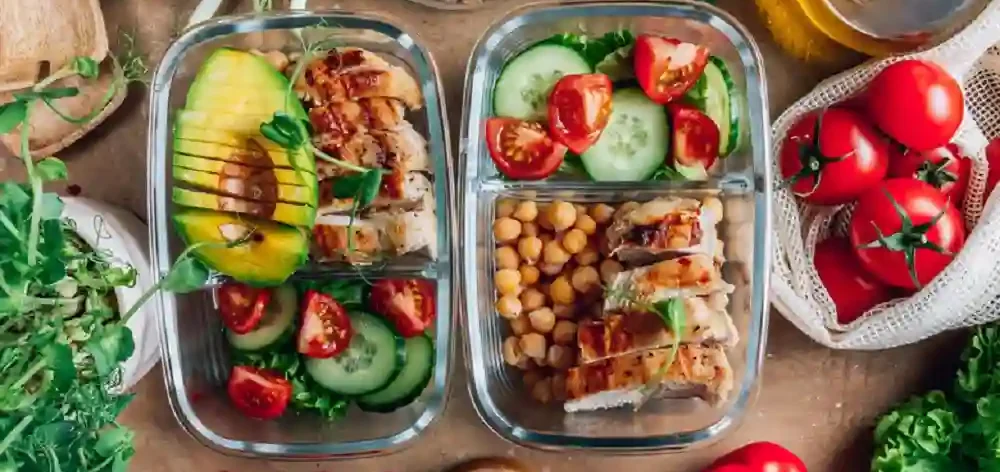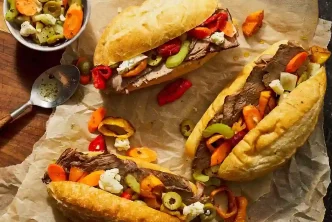Meal prepping is one of the most effective ways to save time, eat healthier, and stay organized in your busy life. Whether you’re looking to lose weight, improve your diet, or simply make your weekdays more manageable, meal prepping can help you achieve your goals. In this ultimate guide to meal prepping for beginners, we’ll walk you through everything you need to know to get started, from the basics to helpful tips and meal ideas.
What is Meal Prepping?
Meal prepping refers to the practice of preparing meals or ingredients in advance, typically for the week ahead. This can involve cooking entire meals, portioning out ingredients, or prepping components like vegetables, grains, and proteins that can be easily assembled into meals later. The idea behind meal prepping is to reduce the time and stress involved in preparing food each day, ensuring you have healthy, homemade meals ready to go.
While meal prepping may seem overwhelming at first, with a little planning and organization, it can save you time, money, and effort. It’s a great way to stay on track with your health goals, whether you’re trying to eat healthier, lose weight, or simply have a more balanced diet.
Benefits of Meal Prepping
Before diving into the “how” of meal prepping, it’s essential to understand why it’s so beneficial. Here are some of the top benefits of meal prepping:
1. Time-Saving
Meal prepping saves you time throughout the week by allowing you to cook everything in one go. Instead of spending time cooking every day, you can spend just a few hours on meal prep, and the rest of the week is hassle-free. You can reheat pre-made meals, making your weeknights much more manageable, especially if you have a busy schedule.
2. Healthier Eating
By planning and preparing meals in advance, you can control the ingredients and ensure that your meals are balanced and nutritious. Meal prepping allows you to avoid the temptation of unhealthy fast food or processed snacks when you’re hungry and pressed for time.
3. Cost-Effective
Eating out or ordering takeout regularly can add up quickly. Meal prepping allows you to buy ingredients in bulk, which is usually more affordable. When you prepare your meals at home, you also reduce food waste because you use exactly what you need.
4. Portion Control
When you meal prep, you portion out your meals in advance, which helps you control your calorie intake. This can be especially helpful if you’re working towards weight loss or maintaining a specific diet. Pre-portioned meals reduce the chances of overeating or reaching for unhealthy snacks.
5. Less Stress
When you meal prep, you take the guesswork out of what to eat each day. Instead of scrambling to come up with dinner ideas or rushing to cook, everything is ready for you to grab and eat, reducing stress and making your life simpler.
Getting Started with Meal Prepping
If you’re new to meal prepping, the thought of cooking for an entire week might seem daunting. But with the right approach, it can be quite simple. Here’s a step-by-step guide to help you get started with meal prepping.
1. Set Your Goals
Before you start, it’s important to determine your meal prep goals. Are you trying to lose weight, maintain a healthy lifestyle, or just save time? Your goals will help determine the types of meals you prep and the ingredients you buy. For example, if you’re focused on weight loss, you may want to include more lean proteins and vegetables in your meals. If you’re prepping for a busy week, you might prioritize quick and easy meals.
2. Choose Your Meal Prep Style
There are a few different approaches to meal prepping, and the one you choose will depend on your personal preferences and schedule. Here are the most popular meal prep styles:
1. Batch Cooking
Batch cooking involves preparing large quantities of a single dish (or multiple dishes) and dividing it into individual servings for the week. This is ideal for people who want to cook once and have meals ready to go for several days.
2. Ingredient Prep
Ingredient prepping means preparing individual ingredients that you can combine to create different meals throughout the week. For example, you might cook a big batch of rice, roast some vegetables, and grill chicken breasts. Then, throughout the week, you can mix and match these components to create different meals, like bowls, wraps, or salads.
3. Ready-to-Cook Prep
This involves prepping the ingredients for cooking but not actually cooking them. For example, you could chop vegetables, marinate meats, and portion out grains, so all you have to do is cook when you’re ready to eat.
4. Freezer Meals
Freezer meals are pre-cooked or partially cooked meals that are frozen for later use. You can prepare entire meals or meal components that can be easily reheated when needed. Freezer meals are a great option for longer-term meal prepping.
3. Create a Meal Plan
Planning your meals in advance is the first step to successful meal prepping. Spend some time each week thinking about what you want to eat for breakfast, lunch, dinner, and snacks. Make sure your meals are balanced, including a variety of proteins, vegetables, healthy fats, and complex carbohydrates. A meal plan will guide your grocery list and help you avoid buying unnecessary ingredients.
Tip: Plan meals that share ingredients, so you can save money and reduce food waste. For example, you could make a salad with grilled chicken for one meal and use leftover chicken for wraps or bowls the next day.
4. Make a Grocery List
Once your meal plan is ready, make a grocery list based on the ingredients you’ll need. Organize the list by categories such as produce, protein, dairy, grains, and pantry items to make your shopping trip more efficient. Check your pantry and fridge to avoid buying things you already have.
5. Choose Simple Recipes
If you’re new to meal prepping, start with simple recipes that require fewer ingredients and minimal cooking techniques. Focus on one-pot meals, sheet pan dinners, or meals that can be easily cooked in large batches. These types of meals are perfect for beginners because they’re straightforward and easy to prepare.
Meal Prep Tips for Beginners
1. Invest in Quality Containers
Investing in high-quality containers is key to successful meal prepping. Look for containers that are microwave-safe, stackable, and leak-proof. Glass containers are a great option because they don’t stain or absorb odors like plastic. You’ll also want to have a variety of sizes to store different types of meals, from large dinner portions to small snacks.
2. Prep for Different Meals
While dinner is often the focal point of meal prepping, don’t forget about breakfast and snacks. Overnight oats, yogurt parfaits, egg muffins, and smoothies are all great options for breakfast that can be prepped in advance. Pre-portioned snacks like cut-up vegetables, fruits, nuts, or hummus can help you avoid unhealthy snacking during the day.
3. Keep Things Balanced
Aim for balanced meals that include protein, healthy fats, vegetables, and whole grains. This will ensure that your meals are satisfying and provide you with long-lasting energy throughout the day. For example, a balanced lunch might include grilled chicken, quinoa, roasted veggies, and avocado.
4. Cook in Batches
When you start meal prepping, cook in large batches. For example, cook a whole chicken or a large pot of soup, then divide it into individual portions. This saves time and effort compared to cooking single servings each day.
5. Label Your Meals
Labeling your meals with the date they were prepared will help you keep track of freshness and avoid eating meals that are too old. It’s a simple way to stay organized and prevent food waste.
6. Store Your Meals Properly
Store your prepped meals in airtight containers and place them in the fridge or freezer, depending on how soon you plan to eat them. Be mindful of the shelf life of different meals—most cooked meals will last for 3-4 days in the fridge, while freezer meals can last up to 3 months.
Meal Prep Ideas for Beginners
Here are a few meal prep ideas that are perfect for beginners:
1. Chicken and Veggie Bowls
Grill or bake chicken breasts and pair them with roasted vegetables like broccoli, sweet potatoes, and bell peppers. Add some quinoa or rice for a complete meal.
2. Overnight Oats
Prepare jars of overnight oats by mixing rolled oats, milk (or a milk alternative), chia seeds, and your favorite fruit. Let them sit overnight in the fridge for a quick and healthy breakfast.
3. Salad Jars
Layer your favorite salad ingredients in mason jars. Start with the dressing at the bottom, then add sturdy vegetables like cucumbers or tomatoes, followed by protein (like chicken or tofu) and leafy greens at the top. When you’re ready to eat, just shake it up!
4. Stir-Fry
Prepare a big batch of stir-fry by cooking a variety of vegetables, tofu or chicken, and a flavorful sauce. Store it in containers with brown rice or noodles for a quick, balanced meal.
5. Egg Muffins
Whisk eggs with vegetables, cheese, and your favorite spices, then pour the mixture into muffin tins and bake. These can be eaten for breakfast or as a quick snack.
Conclusion
Meal prepping may take a little time to get used to, but once you’ve established a routine, it will save you countless hours and help you eat healthier. By planning ahead, preparing ingredients, and cooking in batches, you can enjoy nutritious, homemade meals every day without the stress and hassle of cooking from scratch. Whether you’re looking to save time, eat better, or stick to a specific diet plan, meal prepping is a valuable tool that can transform your approach to food and help you live a more organized, balanced life. Happy prepping!





